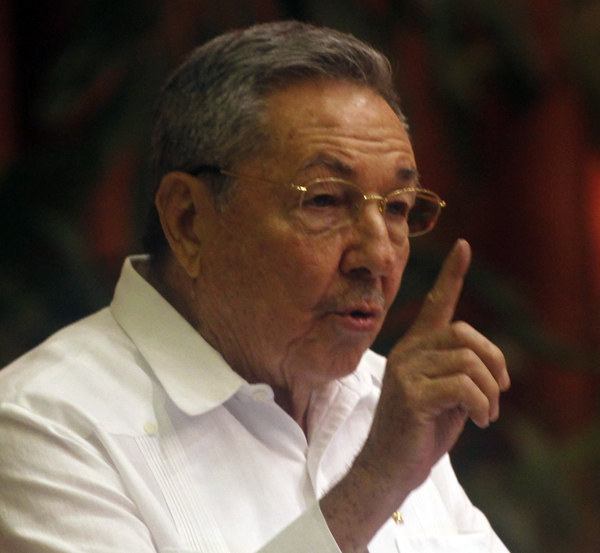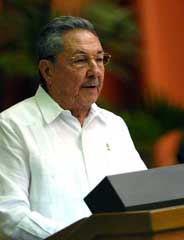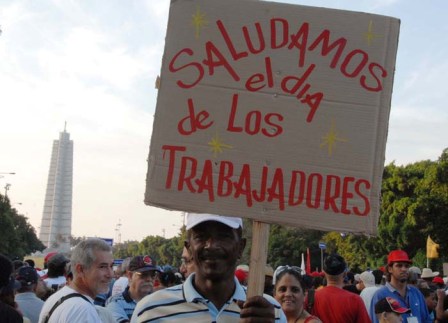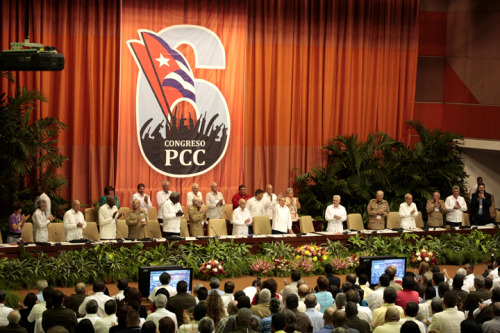Communist Party of Cuba
System or siege? Samuel Farber misses the main cause of Cuba's problems

Cuba since the revolution of 1959: a critical assessment
By Samuel Farber
Haymarket Books, Chicago, 2011
Review by Chris Slee
June 13, 2012 – Links International Journal of Socialist Renewal -- Samuel Farber was born in Cuba, but moved to the United States in 1958. He is an emeritus professor of political science at Brooklyn College of the City University of New York, and has been involved in the socialist movement for over 50 years. He has written extensively on Cuba, from a point of view highly critical of the Cuban government. His views are promoted by sections of the US left, in particular the International Socialist Organization. While many of his criticisms have some validity, in my view he downplays the achievements of the Cuban revolution, and underestimates the impact of the US blockade in causing the problems and difficulties that Cuba faces.
Cuba's alternative to privatisation
[For more analysis and discussion on the changes in Cuba, click HERE.]
By Marce Cameron
March 11, 2012 -- Green Left Weekly/Links International Journal of Socialist Renewal -- Cuban President Raul Castro has urged the Caribbean nation's citizens to contribute to a free and frank debate on the future of Cuba’s socialist project.
For the Cuban Communist Party (PCC), the aim of this debate is twofold: to strive for consensus on a new Cuban model of socialist development and to empower Cuba’s working people to implement what has been decided.
In other words, to advance a socialist renewal process in the face of entrenched opposition from within the administrative apparatus.
It is first and foremost a debate about the economy. A draft policy document, the Economic and Social Policy Guidelines, was submitted to a national debate for three months before to its adoption by the Sixth PCC Congress in April last year.
The core principles and objectives of the draft were conserved, but the final version of the Guidelines was substantially modified on the basis of this public debate.
Rainbow Cuba: the sexual revolution within the revolution

March to celebrate LGBTI rights in Havana, May 2009.
By Rachel Evans
December 23, 2011 (updated January 28, 2012) – Links International Journal of Socialist Renewal -- When I was 16, I went to a Cuba solidarity event in my home town. At the end of inspiring speeches about Cuba’s health record, education standards, and the revolution’s policy of sending doctors and teachers to impoverished countries, a rousing “Cuba si! Yankee no!” chant erupted. It was electric. Much better than the fake feeling, singing and dancing we’d experienced in the church hall on Sunday. I was impressed and resolved to visit the country and see the revolution for myself. Years later and having come out of the closet, I decided my trip to Cuba could help prove or dispel the oft-uttered line of Cuba being homophobic.
This work will help put to bed the lies and distortions propagated by the powerful United States (US) propaganda machine: that the Cuban Revolution is undemocratic, homophobic and tyrannical. My visit to and study of Cuba finds that there is no basis to these claims.
Introduction by Marce Cameron, translator
Cuba: Changes go deep -- democratic reforms

Cubans vote for members of their local Assembly of People's Power.
[For more analysis and discussion on the changes in Cuba, click HERE.]
By José Alejandro Rodríguez, Havana
August 17, 2011 -- Progreso Weekly -- Apart from some exceptions, the powerful international media has ignored a recent Cuban parliamentary bill that would deepen democracy on the island. The reason is obvious: the news is not convenient. The initiative is made within socialist institutionalism, not in terms of the “transition” whose staging is highly anticipated and promoted by certain hegemonic interests in this world.
The idea is to give the green light to an experiment in the new provinces of Mayabeque and Artemisa, which, if they bear fruit, would be extended to the whole country through constitutional reform: the reassignment of the duties of the chairperson of the local Assembly of People's Power and chairperson of the assembly's territorial administrative board to different people, in each municipality and province.
Cuba: National Assembly approves economic changes; Raul Castro's speech

"More than once, I have stated that our own worst enemy is not imperialism but our own errors and that these, if they are deeply and honestly analysed, can be transformed into lessons in order not to fall into them again." -- Raúl Castro
By President Raúl Castro
Speech given by President Raúl Castro Ruz, president of the Councils of State and Ministers, to the 7th ordinary session of the 7th legislature of the National Assembly of People’s Power, August 1, 2011. The parliament earlier that day also adopted the amended Guidelines of the Economic and Social Policy of the Party and the Revolution as state policy.
Compañeras and compañeros:
`No space for shock therapies': Central report to the sixth congress of the Communist Party of Cuba

Cuba's President Raul Castro presents the central report to the sixth congress of the Communist Party.
By Raul Castro
April 16, 2011 -- Comrades all, the opening of the 6th Congress of the Communist Party of Cuba this afternoon marks a date of extraordinary significance in our history, the 50th anniversary of the proclamation of the socialist nature of our Revolution by its Commander in Chief, Fidel Castro Ruz, on April 16, 1961, as we paid our last respects to those killed the day before during the bombings of the air bases.
This action, which was the prelude to the Playa Girón (Bay of Pigs) mercenary invasion organized and funded by the United States government, was part of its plans to destroy the Revolution and restore its domination over Cuba in league with the Organization of American States (OAS).
Cuba: Sixth congress of the Communist Party concludes -- three assessments

Cuba's President Raul Castro addresses the sixth congress of the Communist Party.
[For more analysis and discussion on the economic changes in Cuba, click HERE.]
By Jesús Arboleya Cervera
April 20, 2011 -- Progreso Weekly -- With the enthusiastic support of Fidel Castro, the sixth congress of the Communist Party of Cuba has just ended. Not by happenstance, the date chosen for the meeting coincided with the commemoration of the 50th anniversary of the victory of Playa Girón [Bay of Pigs], an event that had enormous repercussions for the Cuban revolutionary process, not only for its military significance but also because it defined the revolution's socialist character and instilled in the masses an awareness of their own strength that translates into the political capital necessary for the preservation of the revolution.
Camila Piñeiro Harnecker: `Cuba needs changes, to take us forward rather than backwards'

Cuban workers march on May Day 2009. Photo by Bill Hackwell/Havana Times.
How the Communist Party of Australia exposes the Democratic Socialist Party's 'Trotskyism'
By Doug Lorimer
[This article first appeared in the Democratic Socialist Party's internal discussion bulletin, The Activist, volume 10, number 7, August 2000.]
The Communist Party of Australia has recently published a pamphlet by David Matters entitled Putting Lenin's Clothes on Trotskyism which claims that the DSP's rejection of Trotsky's theory of permanent revolution is really a cover for its support for Trotskyism. However, the real purpose of the pamphlet is to criticise the DSP's position on the 1998 waterfront dispute.
This is made clear in the introduction to Matters' pamphlet by CPA general secretary Peter Symon:
In writing Putting Lenin's clothes on Trotskyism, David Matters has contributed to the task of clarifying ideas and maintaining the validity and truth of Marxism...
The attack on Marxism in the name of Marx, or on Lenin in the name of Lenin, is a particularly pernicious form which can easily mislead those who are not familiar with what Marx, Engels and Lenin actually said and wrote.
The pretension that Trotsky was a great Leninist is one of these misrepresentations and was refuted time and again by Lenin.

